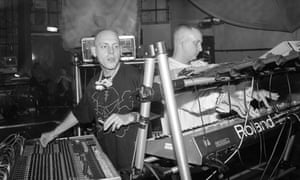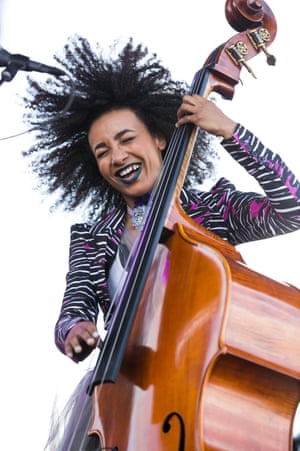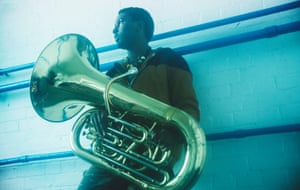Horrible things happen to instruments in transit as Ballak Sissoko and others have recently learned. Five musicians explain why the damage goes more than skin deep

One thing successful musicians have to do a lot of is travel, and when you travel with an instrument, you increase its chances of getting damaged. Early this month, the Malian musician Ballak Sissokos kora was taken apart by US border agents when he left New York, something Sissoko only discovered when he picked it up in Paris. A few days later, Louis Levitt discovered a four-inch crack in his $100,000 double bass after it had been unpacked for security screening at Newark airport, and a few days after that, specialist instrument movers dropped Angela Hewitts 150,000 F278 Fazioli piano while removing it from a studio after a recording session, rendering it unsalvageable.
The loss of an instrument, though, is about more than inconvenience or financial cost. Its about the loss of something that can feel like an integral part of a musicians being its their means of self-expression. And after years of playing one instrument, simply swapping to another isnt as easy as it sounds musicians and their instruments have relationships and losing one can be as hard as losing a lover. Here, five musicians talk about the instruments they play, and what those instruments mean to them.
Brittany Howard, Alabama Shakes
Gibson SG Custom in Inverness Green
A special instrument feels like an extra limb. Once you find that one instrument, a replacement is really hard to come by, and you have to introduce yourself to a whole new limb and get used to it all over again.
This SG is one I was instantly comfortable with, and it just stuck. If I break a string halfway through the set and they pass me a different guitar, it just plays different. Its hard to describe if youre not a guitar player it fits perfectly in your hand, and your hands know what youre doing, because youve worked with the instrument for so long. That way, you are comfortable expressing yourself, and of course the easier an instrument it is to play, the easier it is to express yourself.
My number one thing for my guitar techs is: do not clean the pickups. I like the sound of pickups that are worn down and kind of degraded its just more interesting sounding. That is why my SG is so unique, because of how the pickups were wound, and how long it has been since they were cleaned up.
I think this one is from the early 80s. It has cigarette burns on it, because other people had it before me. It had some cracked paint in the back. The white of the trim has faded into the yellow colour, and all those things hold the history of the instrument. And truthfully, Ive never checked it in with an airline, because I dont trust them. It comes with me on the flight, or its shipped to meet me in a protective case. Thats my right. Everyone else gets to bring their laptops and their work; I can bring my guitar.
Paul Hartnoll, Orbital
Roland Jupiter 6 synthesiser

I went into Sevenoaks Guitars, a secondhand shop, one day in 1991 or 1992, and they had this big old analogue synth blunderbluss for 200. It was my first proper analogue poly synth, and the thing I learned on; it was so integral to the music of the first three or four albums that I cant do without it. Ive tried to replace it, but nothing else will do. About a year ago it started playing up and I got another one that cost something like 4,200, but its not the same. So Im going back to my old one, which has been serviced and repaired. Old synthesisers are like old cars they work best if you use them all the time, so even if Im not using them, Ill tweak a few knobs to keep them happy.
Every instrument feels different. Even drum machines everyones Roland 909 feels different. Ill be saying, Oh, this ones got tribal tom-toms, and everyone else will be saying, What are you talking about? They all sound exactly the same. I think the differences between synths are more pronounced on the big, old analogue models, though. Thats partly because of the devil-may-care way they were made by hand, and partly age. As they grow older, the lines grow deeper and they diverge from each other, depending on what theyve been through: a well-toured Jupiter sounds different from one that has sat in a studio. Classical musicians say instruments mellow with age, and its the same with synthesisers. When people say, Why cant new synths sound the same as vintage ones? the answer is because they havent aged.
I know my Jupiter 6 inside out. I am fluent in it. I can have an idea and I know what it will do with that idea. I know how many millimetres to move my fingers on its controls without even needing to look. I find myself playing with eyes closed, like a prog rock guitarist.
Esperanza Spalding
5/8 upright bass, Czech-made, c1900

her bass. Photograph: Mediapunch/Rex/Shutterstock
I dont travel with this bass. Ive had basses rolled over by luggage trucks; all sorts of horrible things have happened, so I learned my lesson quickly.
I got it when a young bass player developed tendinitis and took it as a cue he wasnt destined to be a bass player. I got it at a ridiculous price. And over the years I have put a lot of love and care and tending to it, and now everyone who touches it is in awe at its beauty and tone.
Familiarity builds a unique relationship with an instrument, because youre investing your time and your care. Theres something about getting acclimated to all of the quirks and resonances, but it also gets acclimated to your touch and hand. Its a deep familiarity. There is less translation time between what your ear wants to create and what your body can facilitate. For me, and anyone in the improvisational world, thats so important. You want to know you can immediately respond to what you perceive.
Sometimes the relationship with an instrument is never really consummated, and thats a cue, too. With the bass I have now, for many years I struggled with it. It was very difficult to play, but I loved the sound. Now, after 15 years, it feels like home. It will keep accumulating with me, and that relationship will deepen. Its a constant.
There is also something about the intention the instrument was made with. In a way, the luthiers are mystics, too, because they are creating these vessels for divine vibrations to enter the world through. When you are using an instrument thats been made for a particular player, through a particular cultural lineage, the instrument itself is charged with so much spirit that it has to be treated with reverence. They are like sacred objects. Thats why it was so painful to hear about Ballak Sissokos kora.
Theon Cross, Sons of Kemet and solo player
Besson Sovereign 982 and Yamaha Neo Maestro 632 double E-flat tubas

I have a tracking device in my flight case. If something happens to my tuba, I cant work. There have been times when it hasnt shown up on the conveyor belt at the airport and the baggage staff have said, Its not here. And I have known for a fact that it is and can tell them to look again. I try not to stress about my instruments too much, but the tracking device has put things a bit more in my power.
Tubas come in different keys. I like E-flats because they are quite versatile; they have the weight and the lower power in them, but Im also able to create in a soloistic way. There are instruments I have played that I couldnt channel on a vibrational level. Musicians want to feel like when we speak, our musical intention is coming out as clear as possible, and not playing the right instrument can prevent you from expressing yourself as quickly and as accurately as you would like. The instruments I have resonate in a way that make me feel comfortable.
The average person who doesnt play an instrument might not hear the differences, but someone who lives with it will know the smallest difference in the tone. It might be minuscule, but to someone who plays, it can make the difference to whether they enjoy playing a gig or not.
Natalie Clein
Simpson Guadagnini cello, 1777

I have a theory that when string instruments have been played really well for 200 years, which is probably the case with my cello, the player changes the instrument on an atomic level, so the wood starts vibrating in a different way. When I play one that hasnt been played at all, or played badly, its like a horse that has been ridden badly for a long time and has lots of bad habits. And while I think my own musical voice is within myself, its impossible at this stage to know what is my voice and what is the voice that came from my Guadagnini. It has coloured my whole life.
I met this cello in Vienna. I fell in love with it on second or third sight. Its like the best people: they take a little bit of time to start unravelling some of their layers. The first time I thought, I dearly hope this is my cello for life was when I played a concert with it. I had the feeling that whatever I had in my mind, in my soul, it would come out in the sound.
The cello travels next to me all the time. I have two seats on airlines. The one time it didnt travel next to me it sat in the cockpit on a flight in South America. No one gets to touch my cello when Im travelling. Ive never thought of it in monetary terms. Its more that I feel like Im travelling with three children my two actual children and one cello. The difference is that the cello doesnt run off.
Do you have a strong bond with a musical instrument? Tell us about it in the comments below.


Recent Comments